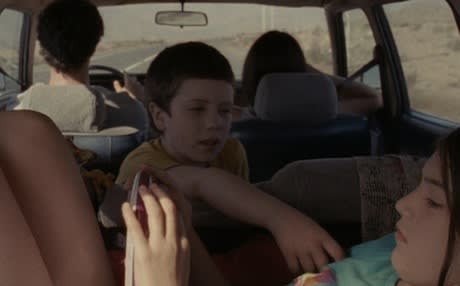Indicative of the languid observational drama about to unfold, the opening scene of Dominga Sotomayor Castillo's debut feature, Thursday Till Sunday, is a five-minute static shot of married couple Ana (Paola Giannini) and Papa (Francisco Pérez-Bannen) waking their kids and carrying them out to the car.
Filmed inside the house, from a darkened corner of a bedroom, we're able to see the driveway through the window in the background while watching a child being woken up in the foreground, giving us a voyeuristic, almost clandestine perspective. We're not forced into a series of guiding compositions and structural familiarity; we're left to quietly observe and come to our own conclusions.
As the title suggests, this very slight, very intimate portrayal of a family in subdued crisis takes place over a weekend. Ana and Papa, having marital problems, have decided to take a road trip with the kids to give them what may very well be their final moments of nuclear family happiness. While the long takes allow us to examine the frame and type of body language and discomfort rarely captured on film, we're mostly relegated to the back seat of the car, where 11-year-old Lucía (Santi Ahumada) witnesses the gradual deterioration of her parents' marriage.
Initially, the sidebar diversions and broken radio car games leave an amiable impression — everyone seems happy and both kids are excited about the many potential destinations of their road trip. However, Ana's body language is different with Papa than with the kids. When Papa picks up two teenage hitchhikers, Lucia is thrilled to socialize with the older girls, but Ana, despite not saying anything outwardly aggressive, clearly isn't impressed with her husband's decision.
What Thursday Till Sunday captures is that awkward transition of innocence to adult awareness. As this family continues down the road to an unknown destination, Lucia beings to see through her mother and father's happy facade. Their arguments become more prevalent and audible, just as her awareness of identity and nascent sexuality begins to stir with the arrival of a family friend (Jorge Becker) and his son, José (Axel Dupré).
This juxtaposition of the self in relation to others with parental fallibility is standard for the coming-of-age parable, yet here there's nothing contrived about the set up. The restrained sense of passive annoyance between Ana and Papa builds with natural, palpable ease, culminating in a devastating, but never exploitive or overdone, realization of the disparate paths of each family member.
Though minor and requiring a great deal of patience, especially with a Western audience used to placating narratives, Dominga Sotomayor Castillo's debut feature demonstrates talent to keep an eye on, having a very mature and astute eye, along with a clever handling of child actors.
(Circe Films)Filmed inside the house, from a darkened corner of a bedroom, we're able to see the driveway through the window in the background while watching a child being woken up in the foreground, giving us a voyeuristic, almost clandestine perspective. We're not forced into a series of guiding compositions and structural familiarity; we're left to quietly observe and come to our own conclusions.
As the title suggests, this very slight, very intimate portrayal of a family in subdued crisis takes place over a weekend. Ana and Papa, having marital problems, have decided to take a road trip with the kids to give them what may very well be their final moments of nuclear family happiness. While the long takes allow us to examine the frame and type of body language and discomfort rarely captured on film, we're mostly relegated to the back seat of the car, where 11-year-old Lucía (Santi Ahumada) witnesses the gradual deterioration of her parents' marriage.
Initially, the sidebar diversions and broken radio car games leave an amiable impression — everyone seems happy and both kids are excited about the many potential destinations of their road trip. However, Ana's body language is different with Papa than with the kids. When Papa picks up two teenage hitchhikers, Lucia is thrilled to socialize with the older girls, but Ana, despite not saying anything outwardly aggressive, clearly isn't impressed with her husband's decision.
What Thursday Till Sunday captures is that awkward transition of innocence to adult awareness. As this family continues down the road to an unknown destination, Lucia beings to see through her mother and father's happy facade. Their arguments become more prevalent and audible, just as her awareness of identity and nascent sexuality begins to stir with the arrival of a family friend (Jorge Becker) and his son, José (Axel Dupré).
This juxtaposition of the self in relation to others with parental fallibility is standard for the coming-of-age parable, yet here there's nothing contrived about the set up. The restrained sense of passive annoyance between Ana and Papa builds with natural, palpable ease, culminating in a devastating, but never exploitive or overdone, realization of the disparate paths of each family member.
Though minor and requiring a great deal of patience, especially with a Western audience used to placating narratives, Dominga Sotomayor Castillo's debut feature demonstrates talent to keep an eye on, having a very mature and astute eye, along with a clever handling of child actors.




